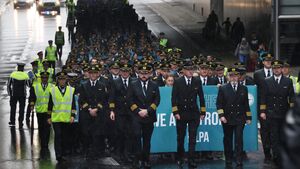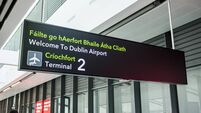Kettle's Boyled: Come fly with me, if we’re not on strike

Aer Lingus pilots, members of the the Irish Air Line Pilots Association (IALPA), march towards the T2 Terminal at Dublin Airport on the first full 8 hour work stoppage in support of their claim for an increase in pay. Photo: Leah Farrell/© RollingNews.ie
My generation has a love-hate relationship with Aer Lingus. We’re old enough to remember the time they operated in lock-step with British Airways on the Dublin-London route, code-sharing flights with identical fares. Back in the 1970s, a return trip to London could cost over £100, equivalent to about €500 today. We had to deal with what was little more than a monopoly, and we paid dearly for it.
On the other hand, we always took a pride in our national airline, and the staff then, as now, were superb and welcoming. If you got stuck in a European city because of strikes or other cancellations, you knew you just had to get to London and Aer Lingus would get you home, often at no cost when they honoured tickets from other routes. In the days before computerisation, you just had to get to the desk in Terminal Two at Heathrow and the green-uniformed staff would look after you.
But mostly we used the ferry from Dun Laoghaire. Trains from Holyhead served all the ferry crossings, or if you wanted to get there really cheaply, a five pound ticket on the Magic Bus would cover the ferry and the bus to London.
Aer Lingus knew that only the better off could afford to fly with them. At that time the end of the Vietnam War caused a flood of refugees from Vietnam, often referred to as ‘the boat people.’ When competition started to drive down fares following the start of competing services to Britain in 1984, the increase in traffic on the route also benefited Aer Lingus, but some staff were known to disparagingly refer to these new customers as ‘the boat people.’ Competition, as well as laws introduced by Europe helped change Aer Lingus from an elite carrier to a low-cost model, but Ryanair were faster to adapt and grew their business rapidly, overtaking Aer Lingus and British Airways combined by the late 1990s. Aer Lingus, like many State-owned carriers around Europe, had become irrelevant in government policy terms, and like Irish Shipping in the previous decade people questioned why we needed to own it. The government initially sold part of the airline, divesting itself of the remainder in 2015. It is now fully owned by IAG, and comprises just 7% of that company’s business.
But the pilots don’t seem to realise they are now small players in a much bigger game. They work in an industry where rates of pay and everything else are effectively dictated by a market where Ryanair is the biggest player. The recent dispute over pay was played out in the media, which is never a good idea, and the long-term cost of this bitter clash may spell the beginning of the end for Aer Lingus. Executives at IAG must surely be wondering whether this tiny offshoot of their business is worth the trouble.






